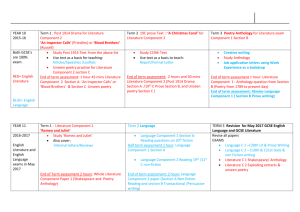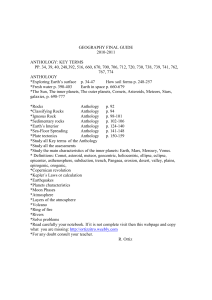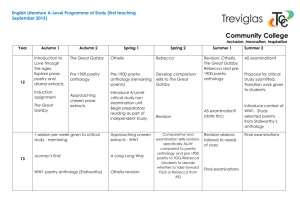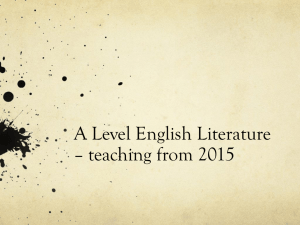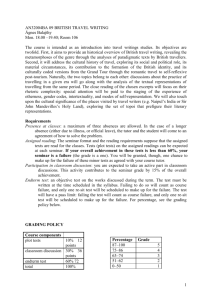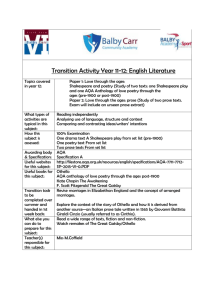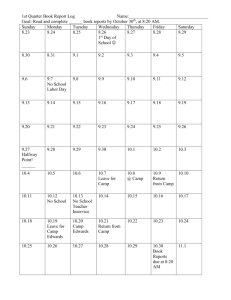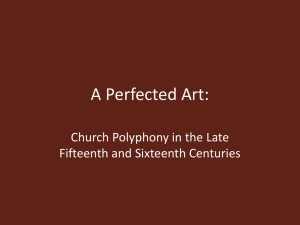Are there specific texts / authors / genres / areas that are not
advertisement
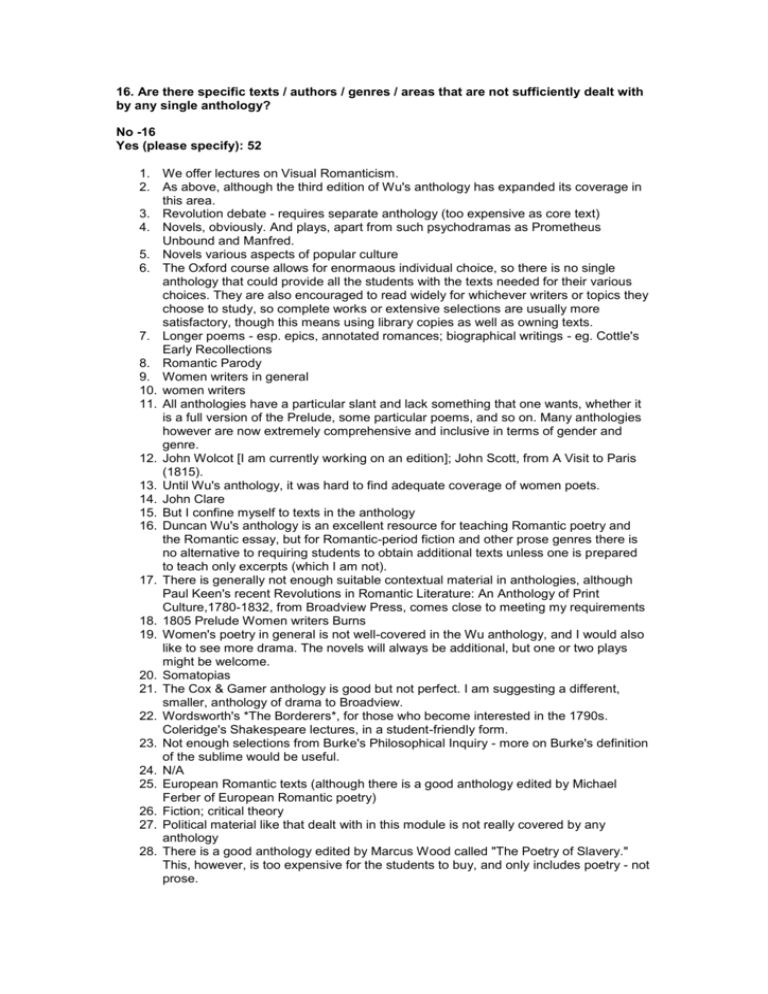
16. Are there specific texts / authors / genres / areas that are not sufficiently dealt with by any single anthology? No -16 Yes (please specify): 52 1. We offer lectures on Visual Romanticism. 2. As above, although the third edition of Wu's anthology has expanded its coverage in this area. 3. Revolution debate - requires separate anthology (too expensive as core text) 4. Novels, obviously. And plays, apart from such psychodramas as Prometheus Unbound and Manfred. 5. Novels various aspects of popular culture 6. The Oxford course allows for enormaous individual choice, so there is no single anthology that could provide all the students with the texts needed for their various choices. They are also encouraged to read widely for whichever writers or topics they choose to study, so complete works or extensive selections are usually more satisfactory, though this means using library copies as well as owning texts. 7. Longer poems - esp. epics, annotated romances; biographical writings - eg. Cottle's Early Recollections 8. Romantic Parody 9. Women writers in general 10. women writers 11. All anthologies have a particular slant and lack something that one wants, whether it is a full version of the Prelude, some particular poems, and so on. Many anthologies however are now extremely comprehensive and inclusive in terms of gender and genre. 12. John Wolcot [I am currently working on an edition]; John Scott, from A Visit to Paris (1815). 13. Until Wu's anthology, it was hard to find adequate coverage of women poets. 14. John Clare 15. But I confine myself to texts in the anthology 16. Duncan Wu's anthology is an excellent resource for teaching Romantic poetry and the Romantic essay, but for Romantic-period fiction and other prose genres there is no alternative to requiring students to obtain additional texts unless one is prepared to teach only excerpts (which I am not). 17. There is generally not enough suitable contextual material in anthologies, although Paul Keen's recent Revolutions in Romantic Literature: An Anthology of Print Culture,1780-1832, from Broadview Press, comes close to meeting my requirements 18. 1805 Prelude Women writers Burns 19. Women's poetry in general is not well-covered in the Wu anthology, and I would also like to see more drama. The novels will always be additional, but one or two plays might be welcome. 20. Somatopias 21. The Cox & Gamer anthology is good but not perfect. I am suggesting a different, smaller, anthology of drama to Broadview. 22. Wordsworth's *The Borderers*, for those who become interested in the 1790s. Coleridge's Shakespeare lectures, in a student-friendly form. 23. Not enough selections from Burke's Philosophical Inquiry - more on Burke's definition of the sublime would be useful. 24. N/A 25. European Romantic texts (although there is a good anthology edited by Michael Ferber of European Romantic poetry) 26. Fiction; critical theory 27. Political material like that dealt with in this module is not really covered by any anthology 28. There is a good anthology edited by Marcus Wood called "The Poetry of Slavery." This, however, is too expensive for the students to buy, and only includes poetry - not prose. 29. There is one anthology on this subject called "Literature and Science in the Nineteenth Century," ed. Otis (OUP), but this does not cover the Romantics sufficiently - instead, it concentrates on the Victorians 30. The Gothic; travel writing; the literature of sensibility 31. Prose, travel-writing, writing from outside UK. 32. (Speaking only of the McGann volume): no Prelude, very poor John Clare selection, relatively limited provision of female poetry 33. Charles Lamb, Thomas De Quincey 34. We teach novels on this module (Austen, Shelley) which are not, by and large, fully reprinted in anthologies. 35. See question 15. While Wu includes sections from Burke, Paine, and Wollstonecraft, they are not the excerpts that I like to teach. 36. Too many to mention: for example, literature and science, literary forgery, popular literature of the period 37. well, probably, but the Wu is ok for most stuff 38. Any anthology only allows an introductory study of any author / issue. Any thing more than this very quickly requires supplementary material 39. Especially drama. (I'm a bit surprised Wu hasn't expanded more in this area for the new 3rd edn.) 40. Almost everyone would answer "yes" since there are always things that one wishes were included. No anthology can capture all the options and possibilities. 41. The Norton anthology is good for poetry, but weak on novels and very selective on political writing. 42. Wu is short on prose fiction and drama. Generally good on poetry and criticism / philosophy / journalism -- or at least fine for a level 2 course. 43. I would like to find a convenient collection of travel literature for the period which gave students some sense of this kind of material. 44. longer verse narratives, especially epics and romances - women poets are still not sufficiently adn diversely represented 45. Labouring-class poets 46. Many novels and prose works cannot (for obvious reasons) be included in an anthology. I also insist that students read complete works and not extracts. 47. Romantic Orientalism 48. Anti-slavery, Orientalism, Women Poets (in the Wu 2nd edition, have not yet used 3rd); Gothic writing 49. ecocriticism 50. Longer poems, non-canonical male and female poets, conservative writers 51. Too many to specify. An anthology can only ever be the ground base of study. 52. I prefer to teach Romanticism as both literature and civilisation/history, and from that perspective one could have wanted a wider spectrum of texts crucial to the period.
